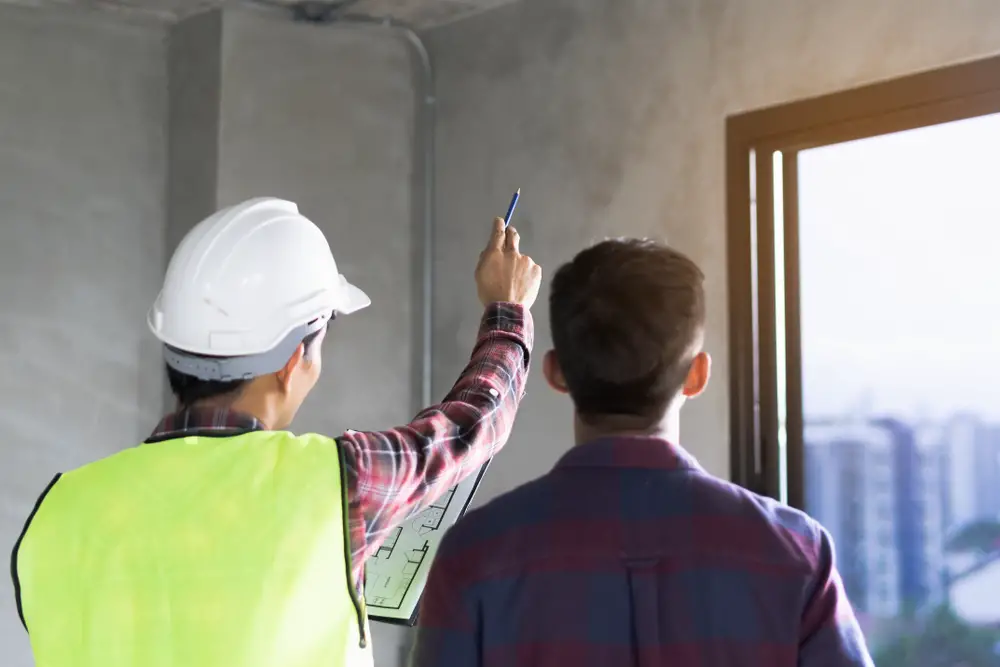
Some people do a lot of DIY and feel comfortable taking the time (and the risk) to do things themselves, even major home renovations. Other people would prefer to hire a construction company or a group of contractors to undertake the work for them.
Depending on the type of work you’re getting done, there is a good chance you’ll be working with a contractor for a relatively lengthy period of time. If you don’t get along with your contractor, it could make the process a lot more painful than it needs to be.
Avoid a building catastrophe and follow these top tips for working with a construction company during your house renovations.
Page Contents
- How do you find a reliable contractor company?
- Gather your information
- Verify the contractor’s insurance and license
- Write down everything on paper
- Be very clear about your preferences and requests
- Talk about the cleanup
- Make your measurements and compare them to the contractor’s
- Try to buy the supplies yourself
- Set a professional tone right from the start
- Always make the final payment when all work is done
- Is there something that contractors don’t like about their customers?
- Frequently Asked Questions
- What do contractors do in house renovation?
- How much should you pay your contractor upfront?
- Is it safe to schedule an appointment with a general contractor during the COVID-19 pandemic? If so, how should you do it?
- What not to say to your contractor?
- What should the contractor’s quote for the job include?
Trust the process
One of the biggest mistakes people make when working with contractors is to watch them like a hawk and question their every move. There’s no issue with watching your builders and questioning if they stray from the original plan, but you need to remember that they’re the professionals.
Rogue tradesmen are out there, but provided you’ve paid due diligence during the hiring process, you have no reason not to trust them. If you’ve verified their licenses and qualifications, called their references, and seen examples of their previous work, and still chosen to go with them, trust them.
No one likes a micromanager, so make sure you give you contractors room to do what they do best.

Communicate clearly
As with anything in life, communication is key, especially when you’re working with contractors. Remember to be clear in your directions and ensure you clarify everything – don’t leave anything down to interpretation.
Speak clearly, be direct, and air any issues you have at the time. If you spot something that isn’t quite right, mention it at the time, and allow the contractors the ability to converse back with you in as equally as clear a way. If you’re unsure what they’re saying or what they mean, ask for clarification. If you’re not open with your communication, you risk things going wrong.
Get it all in writing
In addition to communicating clearly, make sure you get everything in writing. This means your original contract, the agreement of the work that is being undertaken, the cost, and the timeframe should all be written down.
Save all receipts, and if there are any changes to the plan, update the paperwork accordingly. Not only will this make it clear for both parties as to what is expected and what has been agreed at all stages of the build, but it will protect both parties if an issue crops up.
Check the site regularly
Earlier we mentioned to leave the contractors to do their job, and we still stand by this, but it’s important to note that you do need to check the site regularly. Every day, have a look over the site to see what’s been achieved during the course of the day. Make sure to look over it in detail, and if you notice anything that doesn’t look quite right, bring it up.
The sooner you tackle a problem, the sooner it can be solved, and usually for less of a price, too. Checking the site will make it clear that you’re inspecting what has been done and that you’re present and keeping an eye on things, but only doing it once a day will also give the contractors the time and space to do what they need to do with minimal disruption.
How do you find a reliable contractor company?
You don’t need to search high and low for a dependable contractor company. When you have some things to keep in mind, finding a reliable contractor company will go easier. Details are down below.
Gather your information
Some things in life require some research work, and hiring a contractor company is one. Ask your family, friends, and even neighbors for the contractors they recommend. It’s not a bad idea to talk with some of them. It’s essential to write down how they bid for the job and how they collaborate with subcontractors. When you meet them in person, you can see if your personalities click. Since you will collaborate for some time, it’s essential to be on the same page with your contractor.
Ideally, you should examine some of their work and call their references as well. Photos work too, but you should see the work with your own eyes.
Verify the contractor’s insurance and license
If you plan to have the contractor work in your home, you should see if they have a license for residential jobs. Even if you get to see a copy of the license, you should also see the classification. For instance, some contractors don’t have the authorization to work on single-family residential projects that go over $50,000. Contractors may have licenses for commercial jobs but not for residential households. You don’t want to spend time and money on lawsuits, so double-check out all papers.
Write down everything on paper
The paper trail is, vital and it’s beneficial for you and the contractor. Write down all the details about the project, start date, and end date including. Give it to an attorney to revise it before you and your contractor sign it. If any changes occur during renovation, make sure to note them in the contract, initial it and print out the new version for you and the contractor.
See that the totals are automatically calculated by a formula and not manually.
Be very clear about your preferences and requests
You should have a clear idea of what you want to achieve before even you interview various contractors. Don’t assume that people read between the lines—most of them don’t. Once you know what you want, print some pictures of what you agreed to. Show the images to your contractor before he makes the quotes.
Talk about the cleanup
The more detailed is the conversations, the higher the chance for the contractor to achieve what you wish. Make sure you discuss who’s going to clean after the renovation is done. Dust over the furniture, damaged floors, scuffed walls, stray nails, or broken glass isn’t something you want to deal with after the contractor leaves. Old nails, part of old siding, and dust could be all over the place after workers scaffold off the walls. Make sure it’s all gone as stated in the contract.
Make your measurements and compare them to the contractor’s
Contractors tend to overestimate, especially when it comes to carpet, tile, and wallpaper. You might end up paying for the unused extras. Take time, run the numbers, and don’t purchase based on your contractor’s calculations.
Try to buy the supplies yourself
If possible, you should purchase the supplies on your own. At least, make time and accompany your contractor to the store when he/she is getting the supplies. You can never be too sure with a contractor; some may purchase the cheapest supplies and use hoping the homeowners don’t notice.
Set a professional tone right from the start
It’s one thing to have open and honest communication with your contractor, but you shouldn’t strive to be best friends. It’s essential to establish that you’re hiring him right from the beginning and not ask him for a favor. Keeping things consistently professional makes it easy for you to signal any issues and seek solutions.
Always make the final payment when all work is done
It’s wise to keep the down payment to a reasonable number and make subsequent payments when the job is done. Withhold the final check until you’re 100% happy with the results, as stated in the contract.

Is there something that contractors don’t like about their customers?
surprisingly, contractors have also issues about their clients’ behavior, attitude, etc. avoid any conflicts and be aware of the things that contractors won’t tell, but do find annoying for them:
- they don’t want to work with your people
If you hire a contractor for a full-scale kitchen to remodel, they would instead work with their plumber and not your cousin, who is also a plumber.
- they don’t like using old stuff
You may have seen it on Pinterest and liked it, but don’t expect your contractor to like refurbish and reuse old cabinets, for instance.
- they don’t try to make a scheme and make extra work
Suspicious homeowners are convinced that contractors underbid remodel projects to load up with extra tasks after signing the contract. Entirely false.
- they ally with their people and not you
- they don’t want to shop for contractors but expect you do it instead
- they can help with permits but cannot do the impossible
- you cannot negotiate the markup fee
- they don’t want you in the house when working
- they like perfectionists clients
- they’re here to do their job
Frequently Asked Questions
What do contractors do in house renovation?
For extensive projects, additions, or combinations of renovations and repairs, you should hire a professional renovator as a general contractor to organize and take responsibility for all projects. He will be in charge of the design, permits and inspections, sub-contraction tradespeople, and purchasing the building materials and products.
In renovating certain areas (kitchen, bathroom, etc.), you must hire a specialty contractor. It’s common for bathroom and kitchen specialty firms to offer design services, manufacture, or sell the products they can install. Renovation contractors also manage this kind of project.
How much should you pay your contractor upfront?
Don’t pay more than 10% of the estimated contract price upfront. You should ask about the fees and pay by credit when you can. Some contractors may charge a “processing fee,” so ask to have all costs in writing.
Is it safe to schedule an appointment with a general contractor during the COVID-19 pandemic? If so, how should you do it?
To plan an appointment or a consultation with a general contractor during the COVID-19 pandemic, you can begin with some online searching for professionals near you. Contact the contractor and see if they can schedule a video consultation instead of an in-person site visit. During the video call, the contractor will give an idea about the size of your project and provide you with much-needed information about the work. He might also provide you with a quote for the job. Make sure you agree on virtual payments and cautious methods to keep everyone safe during the renovation.
What not to say to your contractor?
It all comes down to how sensitive your contractor is or how good you communicate your demands and possible complaints. To keep the communication flowing, you shouldn’t tell a contractor that you’re not in a hurry or that they’re the only one bidding on the job. It’s also wise not to give your contractor the liberty to choose the materials and not ask them for a discount when paying upfront. Even if you’re an honest person, we don’t recommend you tell your contractor your budget for the renovation work.
What should the contractor’s quote for the job include?
The contractor’s estimate should include quotes from supplies for the raw materials, labor costs, taxes, and other spending estimates. If they get subcontractors for some parts of the work, they should include the proposals as well.
 A Very Cozy Home Home Decor Tips and Ideas
A Very Cozy Home Home Decor Tips and Ideas 